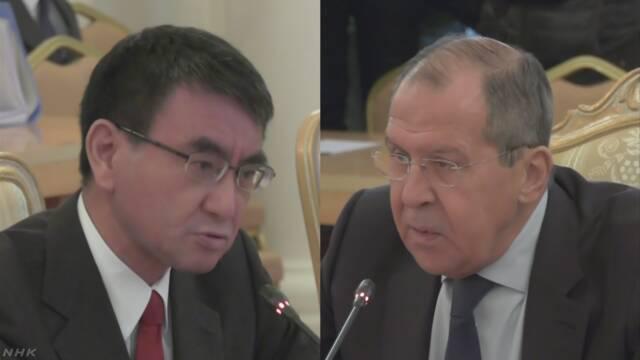

Russia controls the islands. Japan claims them. The Japanese government maintains the islands are an inherent part of Japan's territory. It says the islands were illegally occupied after World War Two.
But the January meeting only highlighted the chasm between the two sides. They are set to resume discussions on January 22nd when Japanese Prime Minister Shinzo Abe and Russian President Vladimir Putin meet. Will they be able to make any progress?
Talks speed up
After last November's talks, Abe had this to say: "I reaffirmed with President Putin that we will not pass on to the next generation this issue that has been left unsolved for more than 70 years since the war. President Putin and I are equally determined to put an end to the issue."
He said he intended to visit Russia again and meet with Putin in the New Year.
Joint Declaration of 1956
The Joint Declaration of Japan and the USSR was signed in October 1956 by Japanese Prime Minister Ichiro Hatoyama and Soviet Premier Nikolai Bulganin. The agreement restored diplomatic relations between the countries. It states the following:
Japan and the Union of Soviet Socialist Republics agree to continue, after the restoration of normal diplomatic relations between Japan and the Union of Soviet Socialist Republics, negotiations for the conclusion of a peace treaty.
The Union of Soviet Socialist Republics, desiring to meet the wishes of Japan and taking into consideration the interests of Japan, agrees to hand over to Japan the Habomai Islands and the island of Shikotan. However, the actual handing over the these islands to Japan shall take place after the conclusion of a peace treaty between Japan and the Union of Soviet Socialist Republics.
(From Japanese Foreign Ministry website)
Even after the USSR's collapse, the leaders of Japan and Russia have continued to acknowledge the declaration's validity. In 2001, Prime Minister Yoshiro Mori and President Putin issued the Irkutsk Statement, confirming that the Joint Declaration would be the starting point of any peace negotiation process.
Special envoys

Last December, Abe and Putin met again, on the sidelines of the G20 Summit in Buenos Aires. They agreed to have Japanese Foreign Minister Taro Kono and his Russian counterpart Sergey Lavrov negotiate the peace treaty. They also agreed to have Senior Deputy Foreign Minister Takeo Mori and Deputy Foreign Minister Igor Morgulov represent their respective leaders as special envoys to speed up negotiations.
Russia's warning
Earlier this month, the Russian Foreign Ministry revealed it had summoned Japanese Ambassador Toyohisa Kozuki over Abe's remark about the need to have the islands' Russian residents understand the change in sovereignty. "Such a remark confuses the people of both countries," Morgulov said. "It represents nothing but an attempt to disrupt the atmosphere of peace talks and to impose Abe's own scenario for resolving the issue.”
On top of this, a Russian Foreign Ministry spokesperson, interviewed by state-run television, mentioned that Japan had refused to hold a joint news conference after a meeting on January 14th between Kono and Lavrov. But a Japanese Foreign Ministry official has denied this. The situation points to the difficult negotiations that lie ahead.

At the meeting, Lavrov said Japan should recognize Russian sovereignty over the islands, while Kono reiterated Japan's position.
Afterwards, Kono told reporters he had made his side's stance clear. Though he admitted "the two countries still have differences on the issue" he added "I hope to find common ground."
Lavrov, on the other hand, didn't try to hide what he saw as a fundamental difference of opinion between the sides. "Japan recognizing the results of World War Two and Russian sovereignty over the islands will be a first step in the peace treaty negotiations," he said. "Russia owns the islands and we cannot allow them to be called the Northern Territories in Japanese law."
A Japanese foreign ministry official has said it is hard to bridge a gap that has existed between the sides for decades. "It is impossible for the two countries to compromise after only one meeting," he said. "We can't be optimistic yet."
The next round of talks
Abe will meet Putin in Moscow on Tuesday. Japan will hope they agree on the start of a drafting process for a peace treaty. Tokyo also wants the leaders to reach a broad consensus when they meet again on the sidelines of June's G20 summit in Osaka.
But things aren't expected to go smoothly. The Russian government's remarks indicate a desire to keep Japan in check. Objection is also growing among the public in Russia about the possible handover of the islands. It remains to be seen how the negotiations will proceed.

